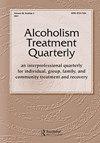解决酒精相关肝病中的治疗性血友病:从肝病学角度看待晚期疾病和姑息治疗
IF 0.9
Q4 SUBSTANCE ABUSE
引用次数: 0
摘要
酒精相关性肝病,在无法治愈的酒精依赖的背景下,是一种终末期疾病。肝脏专家已经习惯了看着病人死去,无论是年轻的还是年老的,这可能会削弱他们认为延长生命的首要责任。虚无主义的出现是很常见的,这可能会影响对未来患者的评估。这篇评论文章通过具有代表性的匿名案例和作者自身的心理反应来探讨这一现象。他建议必须保持治疗的积极性,通过接受这个队列中的患者是绝症患者,从而唤起考虑和获得姑息治疗的需要,可以找到一种更新的病人护理态度。肝病学家必须继续在某些病例中倡导积极的治疗方法(例如,升级到重症监护,移植),同时在有无效指标时准备推荐支持性和姑息性途径之间找到平衡。为了提供这一点,肝病学家可能需要在他们的职业生涯后期提高技能。接受姑息治疗显然对患者有益,本文将其确定为保持医生参与的一种方式。本文章由计算机程序翻译,如有差异,请以英文原文为准。
Addressing Therapeutic Nihilism in Alcohol-Related Liver Disease: A Hepatology Perspective to Terminal Illness and Palliative Care
ABSTRACT Alcohol-related liver disease, in the context of incurable alcohol dependency, is a terminal disease. Liver specialists are accustomed to watching patients die, both young and old, and this may erode their perceived primary responsibility to extend life. It is common for nihilism to set in, with the risk that this colors the assessment of future patients. This opinion article explores this phenomenon through representative, anonymized cases and the author’s own psychological response. He proposes that therapeutic positivity must be maintained, and that a refreshed attitude to patient care can be found through the acceptance that patients in this cohort are terminally ill, thus invoking the need to consider and access palliative care. Hepatologists must continue to find a balance between advocating for an aggressive approach to therapy (e.g. escalation to critical care, transplantation) in selected cases, while being poised to recommend supportive and palliative pathways when there are indicators of futility. To provide this, hepatologists may require upskilling later in their careers. Embracing palliative care is clearly of benefit to patients, and this article identifies it as way of maintaining engagement among doctors.
求助全文
通过发布文献求助,成功后即可免费获取论文全文。
去求助
来源期刊

Alcoholism Treatment Quarterly
SUBSTANCE ABUSE-
CiteScore
1.60
自引率
11.10%
发文量
31
期刊介绍:
Alcoholism Treatment Quarterly is an exciting professional journal for clinicians working with persons who are alcoholic and their families. Designed to bridge the gap between research journals and information for the general public, it addresses the specific concerns of professional alcoholism counselors, social workers, psychologists, physicians, clergy, nurses, employee assistance professionals, and others who provide direct services to persons who are alcoholic. The journal features articles specifically related to the treatment of alcoholism, highlighting new and innovative approaches to care, describing clinical problems and solutions, and detailing practical, unique approaches to intervention and therapy.
 求助内容:
求助内容: 应助结果提醒方式:
应助结果提醒方式:


